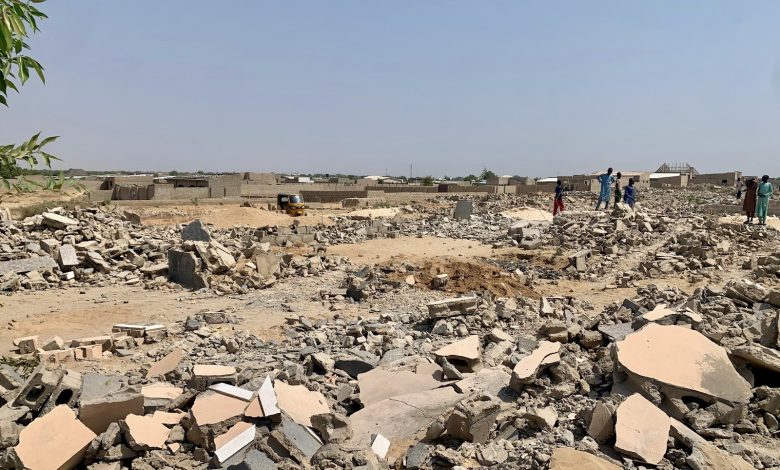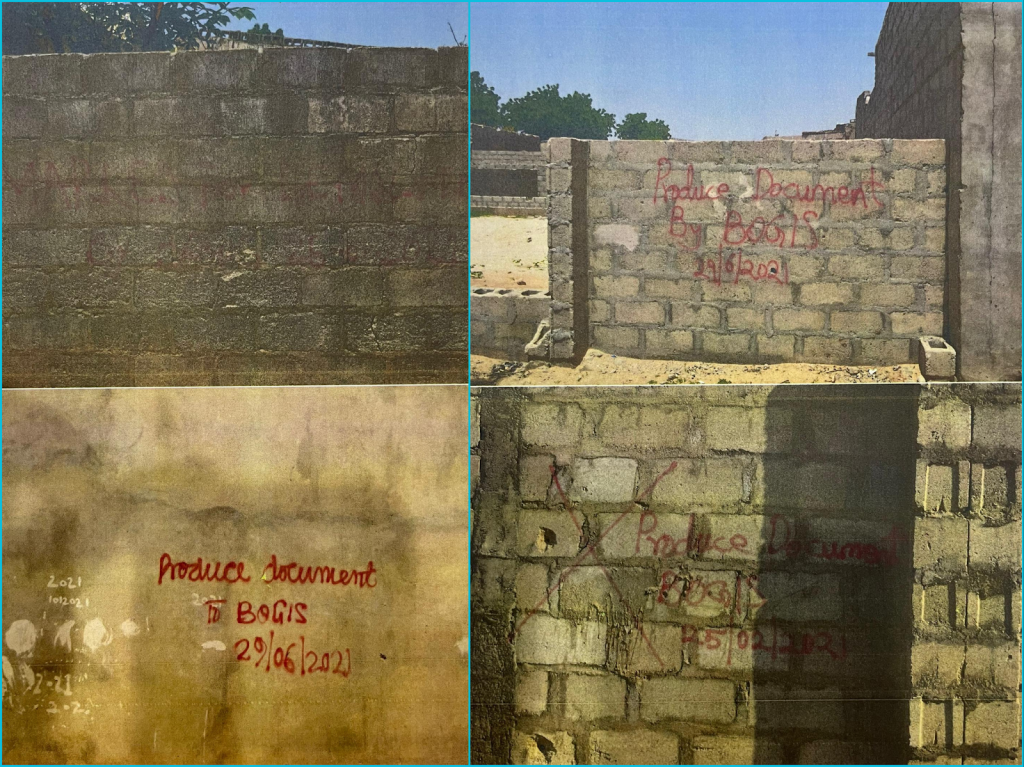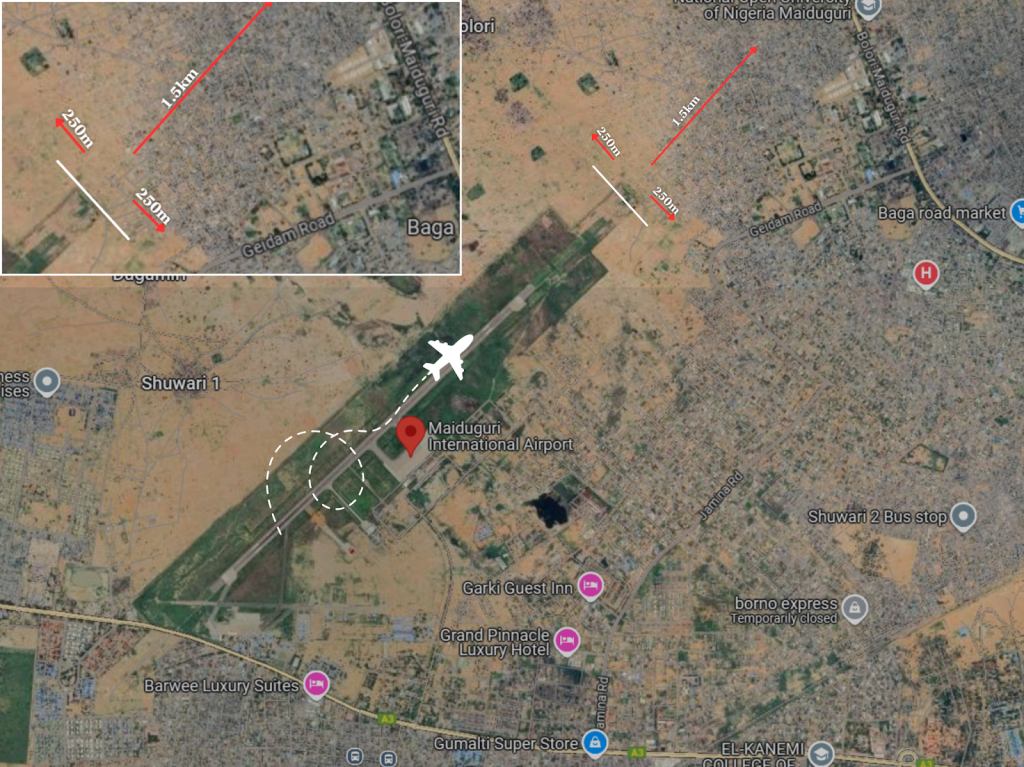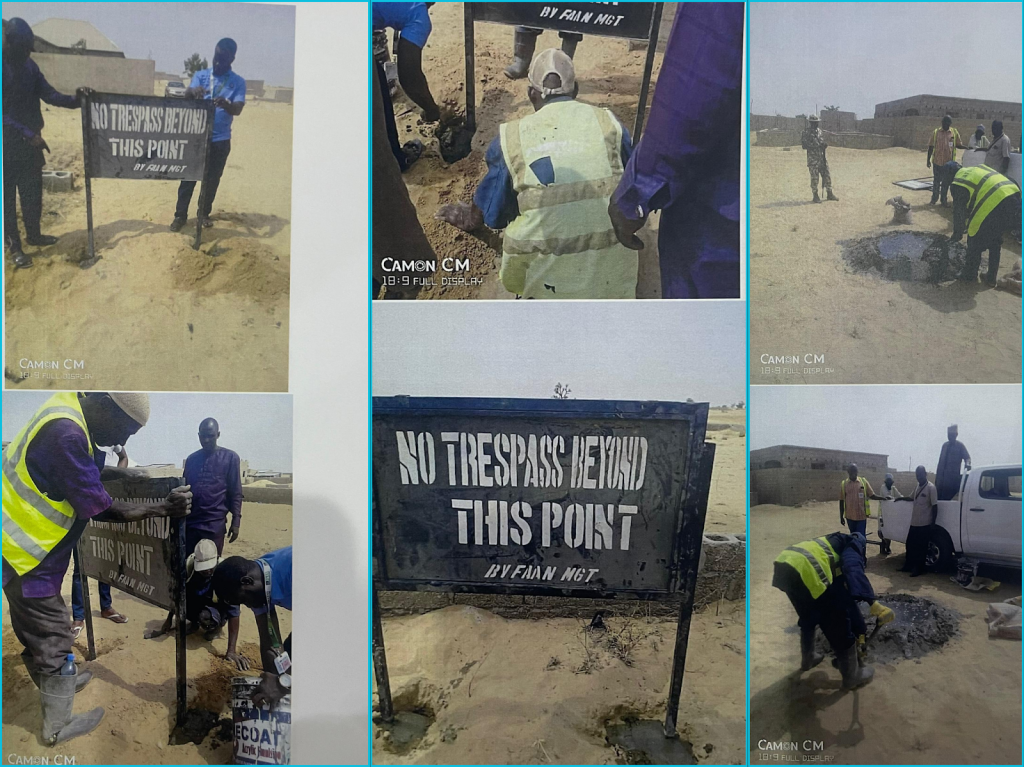Demolition Fallout: Inside the Controversy Surrounding Maiduguri Airport’s Expansion
Residents in Maiduguri’s Shuwari Five community face devastating losses as their homes are demolished to make way for the airport's expansion. Amid the displacement, the government defends the action, citing safety concerns and long-standing land issues.

For 17 years, Hajiya Aisha called Shuwari Five, an airport-adjacent community in Maiduguri, northeastern Nigeria, home. It was where she raised her four children, where memories of her late husband lingered in every corner, and where—despite the hardships of widowhood—she had found some sense of stability. But in an instant, all of that was gone.
“When my husband died, I thought I had already seen the worst,” she told HumAngle, struggling to hold back tears. “Now, the government has destroyed the only home he left for us.”
Aisha is one of many residents whose lives have been disrupted by the demolition of homes in Shuwari Five. The exercise, carried out to make way for the expansion of Maiduguri’s Muhammadu Buhari International Airport, has left hundreds displaced, their dreams and belongings reduced to rubble.
At least three people have died from shock, while more than 20 others have fallen ill from the trauma, locals told HumAngle. “My neighbour had a heart attack when he heard the news. He was taken to the hospital, but unfortunately, he passed away,” Aisha recounted.
“The government claims they informed us about the demolition, but the duration was short: just two days after, the bulldozers arrived. There was barely enough time to gather our belongings,” said Majeed Ali, a newlywed who had just begun building a future with his wife in their small home near the airport. “I am still trying to come to terms with what happened. Our home, belongings, sense of security, everything was taken away from us instantly.”
Bashir Muhammad, another resident, told HumAngle, “I heard that 5,000 houses will be destroyed, and over 500 already have been. It is a big number, and many people will be affected.”

However, Liman Gana, head of the Borno State Building Planning Authority, has refuted claims like Bashir’s. According to Gana, the original plan required clearing a 500-metre radius around the airport for safety and expansion purposes, but the government only demolished structures within 200 metres, leaving a significant portion of the area untouched.
He told HumAngle that the actual number of demolished structures was 306. This includes 64 fully occupied houses, 42 incomplete structures, 50 empty plots, and 17 uncompleted buildings.
Experts also insist that the demolition is necessary. Adamu Sheikh, a Maiduguri-based official of the Federal Airports Authority of Nigeria (FAAN), cited technical and safety concerns, stressing the risks posed by structures built too close to the airport’s runway.
“The expansion aims to accommodate larger aircraft, which require longer runways and clear surrounding areas for safe takeoff and landing,” he explained. “Structures near the airport can obstruct flight paths, pose turbulence risks, and be affected by strong vibrations and sound waves from landing and departing planes.”
Sheikh also noted that international aviation safety regulations discourage residential and commercial buildings near runways, as prolonged exposure to high-decibel noise and aircraft-generated air pressure can weaken structures over time, endangering residents.
Despite these explanations, displaced residents argue that proper planning and resettlement measures should have been implemented before demolition. Many insist they were never warned about the risks when they purchased or built their homes, and they believe the government should have engaged them in dialogue or provided compensation before tearing down their properties.
A decades-old issue
Adam Bababe, the Executive Secretary of the Borno Geographic Information Service (BOGIS), told HumAngle that the land in question has been under government control since 1976, when the Federal Government officially acquired it to construct the airport. The area was entirely farmland at the time, and no residential structures existed.
“The federal government met with the Bulamas (community leaders) in the 70s before acquiring the land, and full compensation was paid to the 79 ancestral dwellers at that time. The land was never meant for private ownership,” Bababe said.
Since the 70s, the government demarcated a buffer zone around the airport for safety and future expansion. Initially, this zone extended 1.5 kilometres from the airport perimeter, but it was later reduced to 500 metres to accommodate development in the surrounding areas. Despite these adjustments, illegal encroachment persisted over the years, driven mainly by land vendors and some traditional leaders who misled buyers into believing the land was available.

In 2010, the state government demolished 36 buildings after the airport authority reported encroachment on land designated for agricultural use. In 2020, the airport authorities formally wrote to the state governor, and in 2021, they wrote to BOGIS, highlighting the rapid growth of building encroachment. In response, the BOGIS and airport authorities took action by installing signposts and issuing warnings to deter further encroachment.
“People were warned several times. Notices were issued repeatedly, but they ignored them and continued building. Land vendors deceived some, but that does not change the fact that this land was never meant for private use,” Bababe added.
He further emphasised that the government does not compensate individuals who build illegally, as doing so would set a dangerous precedent and encourage future land violations.
“Compensation is not paid for illegal activities. If we allow that, people will continue to violate laws, expecting to be compensated every time the government enforces regulations,” the BOGIS chair noted. “We are investigating those who sold these lands illegally. If any traditional leaders or vendors are found guilty, they will be removed from their positions and face appropriate legal action.”
In response to widespread allegations that Bulamas and Lawans (ward heads) conspired with individuals to sell land in restricted areas near the Maiduguri Airport, the Borno State Government has taken action against the traditional leaders involved. “Yes, they have been suspended,” Dauda Iliya, the state government spokesperson, told HumAngle.
‘Development by deception’
BOGIS officials told HumAngle that these traditional rulers and vendors not only facilitated the illegal sale of land but also actively encouraged buyers to speed up construction in anticipation of government demolitions.
“These leaders conspired with land buyers, urging them to hastily erect buildings under the false impression that, if the government eventually demolished their houses, they would be entitled to compensation,” Bababe told our reporter
This orchestrated scheme led to a sharp increase in construction over the past two years, particularly in late 2023 and 2024, despite repeated stop-work notices issued by the state authorities. The BOGIS chair noted that in 2022, labourers worked day and night, rushing to complete structures in the restricted zone.

“We received intelligence indicating that construction activity intensified, especially at odd hours—late into the night and even before dawn. This was no coincidence. It was a calculated effort by certain individuals to erect houses quickly, hoping that once the government moved in to enforce the law, they could claim compensation,” Bababe said while referencing a yearly development timeline of the community on Google Maps.
The situation was further compounded by organised misinformation, which led potential buyers and other community members to believe that previous government land acquisitions had resulted in payouts, encouraging them to take the risk.
While expressing sympathy for the affected residents, the BOGIS chair emphasised that this was a long-standing issue and that the government had exhausted all efforts to prevent it. He urged prospective land buyers to verify property ownership with BOGIS before purchasing to avoid falling victim to fraudulent sales.
Meanwhile, displaced residents remain frustrated. “Our problem before was just finding food to eat every day. But now, we have been displaced from our own homes by the government. We are struggling to survive, and it is getting harder every day,” said Bukar Umar, a long-time resident.
The demolition of homes in Shuwari Five, a community in Maiduguri, Nigeria, has displaced many residents, including Hajiya Aisha, for the expansion of Muhammadu Buhari International Airport.
The rapid government action, perceived as lacking sufficient notification, has left the displaced residents struggling and has resulted in several casualties due to shock and trauma.
Amidst claims of demolishing 5,000 structures, the Borno State Building Planning Authority clarified that 306 structures were affected within a 200-meter radius.
This issue dates back decades, as the airport land was acquired in the 1970s, and illegal encroachment persisted due to land vendors and traditional leaders misleading buyers.
The government maintains that compensation is not granted for illegal constructions and has suspended leaders involved in these transactions.
Despite acknowledging the residents' plight, officials stress that the demolitions were necessary for safety and compliance with international aviation regulations, urging verification of land ownership before purchasing.
Support Our Journalism
There are millions of ordinary people affected by conflict in Africa whose stories are missing in the mainstream media. HumAngle is determined to tell those challenging and under-reported stories, hoping that the people impacted by these conflicts will find the safety and security they deserve.
To ensure that we continue to provide public service coverage, we have a small favour to ask you. We want you to be part of our journalistic endeavour by contributing a token to us.
Your donation will further promote a robust, free, and independent media.
Donate HereStay Closer To The Stories That Matter




